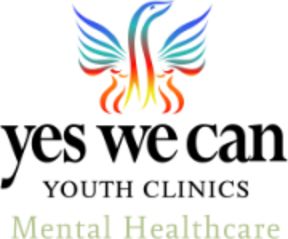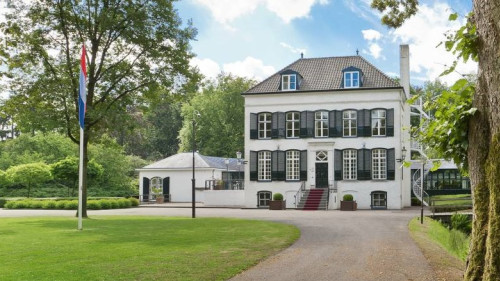
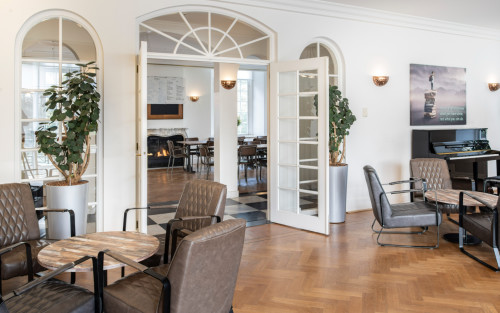
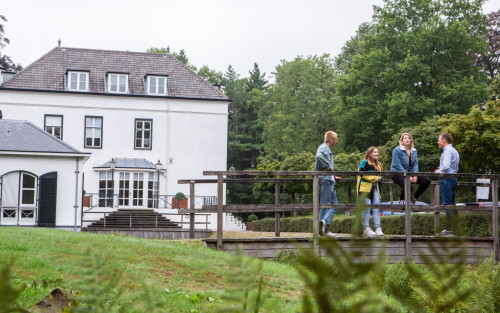



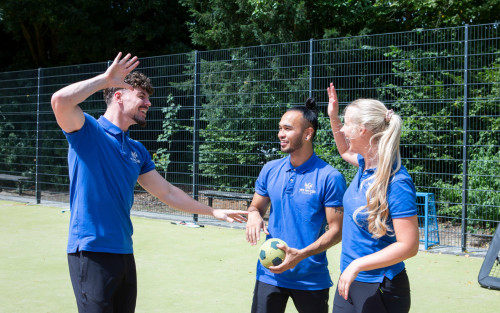
Yes We Can Youth Clinics
Verified Center
This provider's information has been quality-checked by Recovery.com's Research Team for accuracy and completeness, including center verification through appropriate third-party organizations.
Treatment Focus
This center treats substance use disorders and mental health conditions. You'll receive individualized care catered to your unique situation and diagnosis, learn practical skills for recovery, and make new connections in a restorative environment.
Primary Level of Care
Offering intensive care with 24/7 monitoring, residential treatment is typically 30 days and can cover multiple levels of care. Length can range from 14 to 90 days typically.
Treatment Focus
This center treats substance use disorders and mental health conditions. You'll receive individualized care catered to your unique situation and diagnosis, learn practical skills for recovery, and make new connections in a restorative environment.
Primary Level of Care
Offering intensive care with 24/7 monitoring, residential treatment is typically 30 days and can cover multiple levels of care. Length can range from 14 to 90 days typically.
Provider's Policy
Yes We Can Youth Clinics has in-network relationships with Insurance Brokers and Insurance Agencies like: gmmi, AP Companies, Henner, International SOS, CIGNA, afspa and GEO BLUE. These parties represent insurance companies like: AXA, The World Health Organisation, Tricare, BUPA, BlueCross, Blue Shield, AETNA, Generali, World Health Organization and United Health Care Global. Yes We Can Youth Clinics also has a strong cooperation with and gets reimbursed by many other insurance companies with whom they do not (yet) have a contract. Please reach out to them to find out more about insurance coverage possibilities for their treatment programme.
Yes We Can Youth Clinics
Yes We Can Youth Clinics
About Yes We Can Youth Clinics
For various reasons, young adults can become completely stuck in their lives. If other treatments or support have had little to no effect, Yes We Can Youth Clinics seeks to be the turning point. Every year, they treat more than 1.000 young people in their national and international clinics, from 13 to 25 years, with mental health issues, addictions and behavioural problems. The treatment programme consists of a 10-week residential treatment programme followed by a 10-week digital aftercare programme. Since the start in 2011, unconditional warmth, safety and confrontation at the right time are pivotal. Together with other young people (called “fellows”) from all around the world, they will learn to recognise and acknowledge their problems, ask for help and speak out. In parallel with the child’s treatment, parents/carers will participate in an intensive family coaching and counselling programme. During the treatment, over 500 highly specialised healthcare professionals work hard to help the fellows and their families turn hopelessness into happiness.
Safe atmosphere where unconditional warmth and creating recognition are pivotal
At Yes We Can Youth Clinics, unconditional warmth, safety, and confrontation at the right time are pivotal. Many young people at the clinic face the same problems, such as depression, trauma, and substance use. Problems that many of their colleagues have overcome themselves. This creates a lot of recognition between fellows and employees. The group dynamics create the will and the strength for the fellows to really change.
Specialised healthcare professionals who are present 24/7
Yes We Can Youth Clinics works with multidisciplinary teams to make sure fellows are never alone in the clinic. Psychiatrists and registered clinical psychologists collaborate with expert-by-experience counsellors, youth coaches, a medical staff, psychologists, family therapists, youth/educational workers, socio-psychiatric nurses, educationalists, systemic therapists, nurses and youth coaches to support and supervise the treatment process. A personal case manager and therapist will guide the fellows and their families through the process from start to finish. In total, more than 500 professionals work for and with the fellows, and the youth coaches are present 24/7.
All-English intensive residential treatment programme
Yes We Can Youth Clinics offers an intensive 24/7 residential treatment programme of 10 weeks, followed by a 10-week aftercare programme, that teenagers and adolescents participate in together with other fellows. They learn to recognise together that they have problems, ask for help, and tackle them. There is also an intensive family programme for parents and carers. The treatment of Yes We Can Youth Clinics is successful for many of the fellows they treat. 74% of their fellows no longer need specialist care after Yes We Can.

Highlights from the Center
Highlights
These highlights are provided by and paid for by the center.
Therapeutic Location
Customized Treatment Plans
Certified Professionals
Adolescents
Center Overview
Treatment Focus
This center treats substance use disorders and mental health conditions. You'll receive individualized care catered to your unique situation and diagnosis, learn practical skills for recovery, and make new connections in a restorative environment.
Insurance Accepted
Cash Pay Rates
Estimated Cash Pay Rate
Center pricing can vary based on program and length of stay. Contact the center for more information. Recovery.com strives for price transparency so you can make an informed decision.

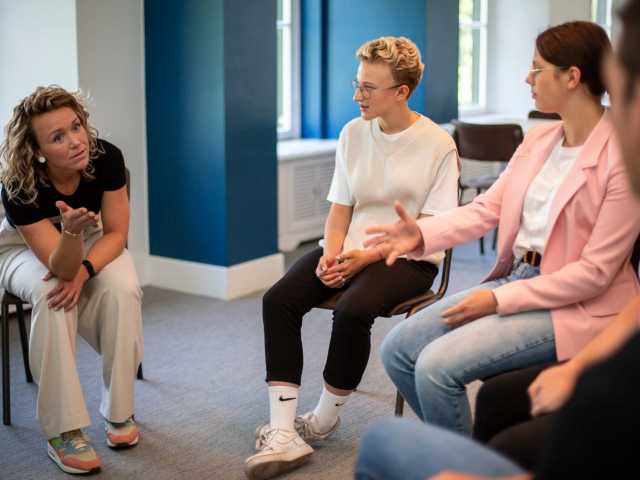


Levels of Care







Your Care Options
Specializations
Adolescents
Teens receive the treatment they need for mental health disorders and addiction, with the added support of educational and vocational services.
Young Adults
Emerging adults ages 18-25 receive treatment catered to the unique challenges of early adulthood, like college, risky behaviors, and vocational struggles.
Who We Treat
Adolescents
Teens receive the treatment they need for mental health disorders and addiction, with the added support of educational and vocational services.
Young Adults
Emerging adults ages 18-25 receive treatment catered to the unique challenges of early adulthood, like college, risky behaviors, and vocational struggles.
LGBTQ+
Addiction and mental illnesses in the LGBTQ+ community must be treated with an affirming, safe, and relevant approach, which many centers provide.
Men and Women
Men and women attend treatment for addiction in a co-ed setting, going to therapy groups together to share experiences, struggles, and successes.
Mild Disabilities
Adults with mild physical or intellectual disabilities receive treatment catered to their specific needs in a safe and clinically supportive environment.
Approaches
Evidence-Based
A combination of scientifically rooted therapies and treatments make up evidence-based care, defined by their measured and proven results.
Experiential
Expressive tools and therapies help patients process past situations, learn more about themselves, and find healing through action.
Family Involvement
Providers involve family in the treatment of their loved one through family therapy, visits, or both–because addiction is a family disease.
Holistic
A non-medicinal, wellness-focused approach that aims to align the mind, body, and spirit for deep and lasting healing.
Therapies
1-on-1 Counseling
Patient and therapist meet 1-on-1 to work through difficult emotions and behavioral challenges in a personal, private setting.
Meditation & Mindfulness
A practiced state of mind that brings patients to the present. It allows them to become fully aware of themselves, their feelings, and the present moment.
Trauma-Specific Therapy
This form of talk therapy addresses any childhood trauma at the root of a patient's current diagnosis.
Mindfulness Therapy
This ancient practice can be mental, emotional, and even spiritual. In meditation, you focus your attention on the present moment without judgement.
Adventure Therapy
This experiential approach uses the physical and emotional challenges of outdoor activities as tools for personal growth.
Art Therapy
Visual art invites patients to examine the emotions within their work, focusing on the process of creativity and its gentle therapeutic power.
Conditions We Treat
Pornography Addiction
A person with a porn addiction is emotionally dependent on pornography to the point that it interferes with their daily life and relationships.
Schizophrenia
Schizophrenia is a serious mental health condition that causes hallucinations, delusions, and disordered thinking.
Grief and Loss
Grief is a natural reaction to loss, but severe grief can interfere with your ability to function. You can get treatment for this condition.
Personality Disorders
Personality disorders destabilize the way a person thinks, feels, and behaves. If untreated, they can undermine relationships and lead to severe distress.
ADHD, ADD
ADHD is a common mental health condition caused by dopamine imbalance. Common symptoms include inattention, hyperactivitiy, and impulsivity.
Anger
Although anger itself isn't a disorder, it can get out of hand. If this feeling interferes with your relationships and daily functioning, treatment can help.
Anxiety
Anxiety is a common mental health condition that can include excessive worry, panic attacks, physical tension, and increased blood pressure.
Bipolar
This mental health condition is characterized by extreme mood swings between depression, mania, and remission.
Substances We Treat
Alcohol
Using alcohol as a coping mechanism, or drinking excessively throughout the week, signals an alcohol use disorder.
Benzodiazepines
Benzodiazepines are prescribed to treat anxiety and sleep issues. They are highly habit forming, and their abuse can cause mood changes and poor judgement.
Chronic Relapse
Consistent relapse occurs repeatedly, after partial recovery from addiction. This condition requires long-term treatment.
Co-Occurring Disorders
A person with multiple mental health diagnoses, such as addiction and depression, has co-occurring disorders also called dual diagnosis.
Cocaine
Cocaine is a stimulant with euphoric effects. Agitation, muscle ticks, psychosis, and heart issues are common symptoms of cocaine abuse.
Drug Addiction
Drug addiction is the excessive and repetitive use of substances, despite harmful consequences to a person's life, health, and relationships.
Ecstasy
Ecstasy is a stimulant that causes intense euphoria and heightened awareness. Abuse of this drug can trigger depression, insomnia, and memory problems.
Heroin
Heroin is a highly addictive and illegal opioid. It can cause insomnia, collapsed veins, heart issues, and additional mental health issues.
Psychedelics
Hallucinogenic drugs—like LSD—cause euphoria and increased sensory experiences. When abused, they can lead to depression and psychosis.
Languages
Aftercare
Care Designed for Your Needs
Personal Amenities
Amenities
Special Considerations
Healthy Meals are provided
Great food meets great treatment, with providers serving healthy meals to restore nutrition, wellbeing, and health.
Young Adults Program
Programs for young adults bring teens 18+ together to discuss age-specific challenges, vocational and educational progress, and successes in treatment.
Activities
Yoga
Yoga is both a physical and spiritual practice. It includes a flow of movement, breathing techniques, and meditation.
Off-Site Activities
Off-Site Amenities
What people are saying
Treatment
4.8
Accommodations
4.3
Food & Nutrition
4.0
Value
4.8
Mark
Treatment in 2021 • (70 days) • Reviewed 03/21/24
Loved One of a Former Client
BK
Treatment in 2019 • (60 days) • Reviewed 08/10/19
Former Client
•Student
•UK






